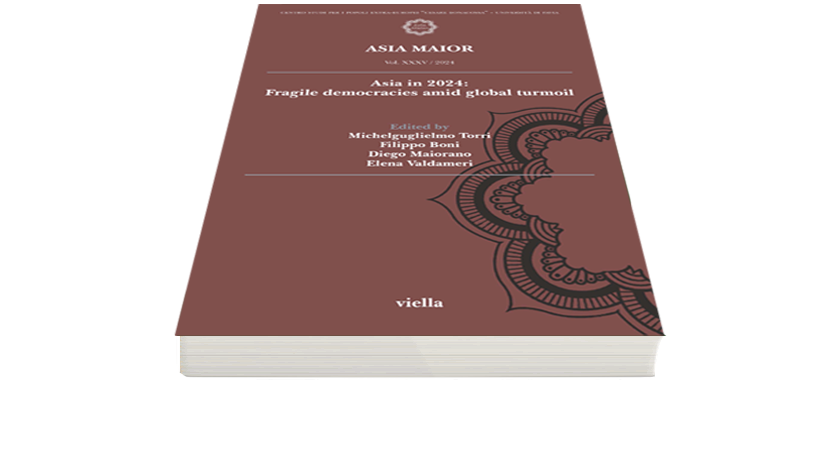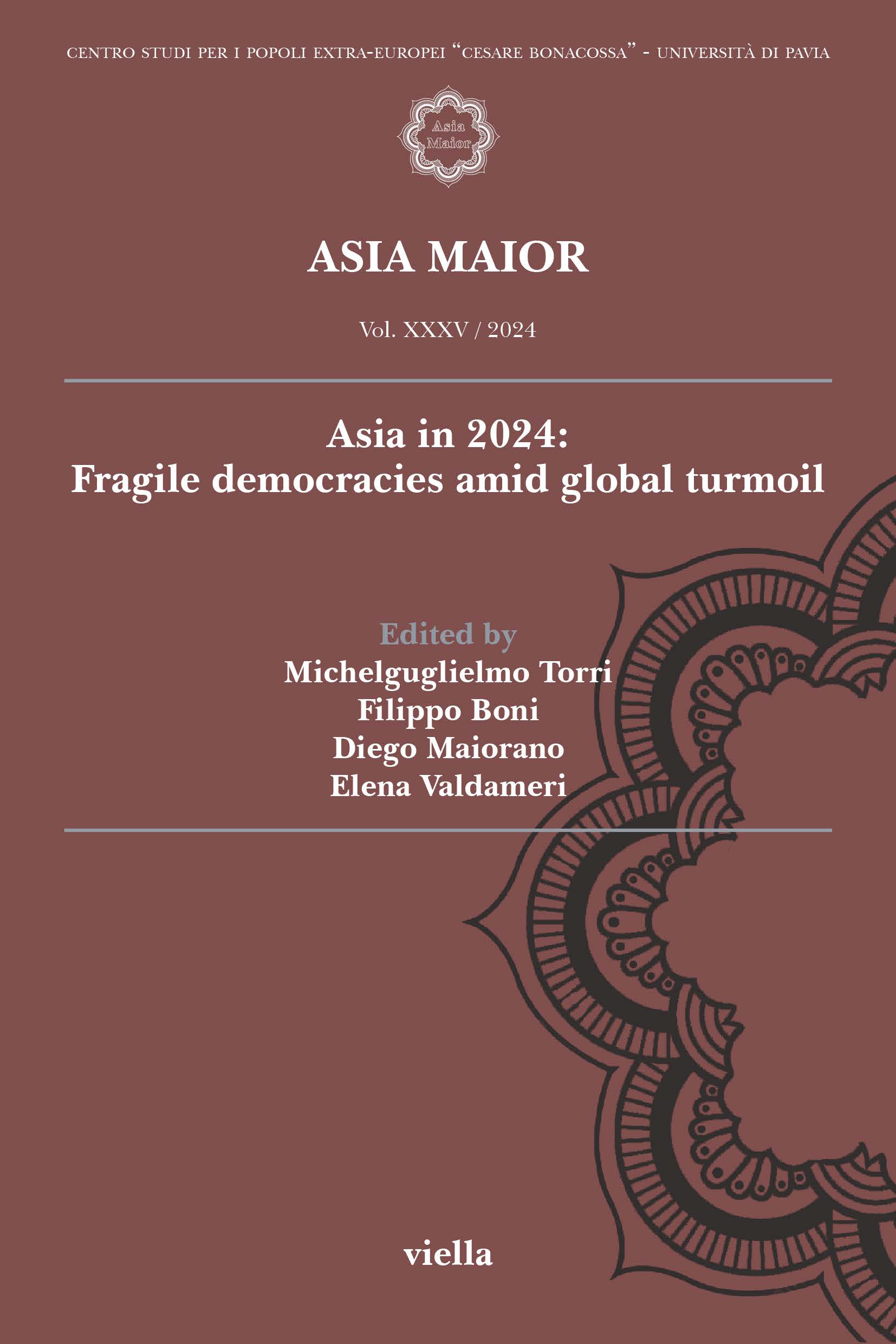India’s Self, Others, and World View: Explained Through Discourse Theory
Available also in pdf – Download Pdf
Thorsten Wojczewski, India’s Foreign Policy Discourse and Its Conceptions of World Order: the Quest for Power and Identity, Abingdon: Routledge, 2018, 222 pp. (ISBN 9781138297180).
The Republic of India celebrated the 70th anniversary of its independence in 2018, and its 70th Republic in January 2019, commemorating the coming into effect of the Constitution adopted in 1949. In policy circles, academia, as well as in public opinion, India’s foreign policy is commonly seen as having undergone different «phases», changing along with the upheavals of the country’s domestic politics as well as the transformation of the world order. As seven decades of independent India came to a close, we can count numerous accounts of the country’s international relations – authored by practitioners, as well as foreign policy analysts and historians – focusing on one specific «phase», or on the seven decades of independent history as a whole.
Indian foreign policy had become a mainstream topic of publication from within and without the country by the beginning of the 2000s, when following the economic liberalisation of the 1990s India became widely rec- ognised as an «emerging economy» as well as an «emerging power», consequently drawing considerable interest from outside the region and from non-South Asianists as well. In terms of scholarly works, some have considered the role of India’s identity, while many have adopted the lens of realism to explain India’s behaviour within the international arena, drawing a causal link between specific historical circumstances, India’s national interest, and its foreign policy, and favouring the «material» to the detriment of «ideational».
But is there any theorisation of India’s identity, an extensive explanation of how India used to see the world and sees it today? I remember asking myself and my supervisor this question a few years ago, as a graduate student grappling with the problem of India’s identity as an emerging development partner. We concluded that, to the best of our knowledge, there had so far been no exhaustive academic treatise of India’s weltanschauung.
Thorsten Wojczewski’s India’s foreign policy discourse and its conceptions of world order: the quest for power and identity is possibly the first comprehensive and theory-grounded scholarly account of India’s world view. The book exposes the origin and evolution of India’s conception of the world and its effect on the country’s behaviour as an international actor, i.e. its foreign policy. This in itself makes the book an important contribution to the field. In addition to this, the book is theoretically innovative, as it adopts post-structuralist discourse theory as its theoretical framework. Wojczewski is the first to apply such non-mainstream theory to the case of India. As a consequence, his work is both a much needed and an original contribution to the field.
The book is based on the author’s doctoral research, as proved by its structured exposition, which retains the core elements of a dissertation. Wojczewski uses post-structural discourse and textual analysis as his theory and methodology of reference respectively. The author aims at bringing Ernesto Laclau’s and Chantal Mouffe’s discourse theory into the study of IR, specifically India’s. Rejecting constructivist IR theory, Wojczewski argues that foreign policy is not only a manifestation of a state’s world view and internal identity but plays a crucial role in the constitution of this very identity. While mainstream approaches to IR understand power shifts as redistribution of material power assets, post-structuralist discourse theory configures them as discursive phenomena. Accordingly, the current shift of power from the West Eastwards must be understood as the dislocation of a so-far hegemonic discourse (Western IR). A hegemonic discourse, the carrier of a specific world view which becomes universally accepted, once dislocated creates space for non-hegemonic discourses (in this case, post-Western IR) to assert their own alternative vision of the world.
Wojczewski then applies the concepts of discourse and dislocation to the case of India, contending that independent India had articulated its own identity with the cold war as its «principal Other». When this ceased existing following the fall of the USSR, India was consequently faced with an identity crisis, in other words, a «discursive struggle» in which old identities were questioned and new ones needed to be articulated. As a result, Nehruvian hegemonic discourse identified new Others, defining itself vis-à- vis Pakistan and (after 1962) China. According to Wojczewski, the following hegemonic discourse, the Post-Nehruvian one, shaped itself in contrast to spatial (Pakistan and China) and temporal (colonialism) Others. He argues that with the emergence of the latest discourse, that of Hyper-Nationalism, there has been an overall increase in the antagonism which characterises the relationship between Self (India) and Others. At the same time, there are important continuities: the Others are still identified as Pakistan and China on the one hand and colonialism on the other; the concept of colonialism, however, now includes not only Western imperialism but Islam as well.
Another central element in Wojczewski’s theorising is the idea of fantasy, derived from the work of Glynos and Howarth. Fantasies or fantasmatic narratives «construct a seemingly stable, natural or trascendental foundation on which the imaginary essence of the Self can be grounded (e.g. mature, religion or ancient epics) and place the Self in a linear, coherent story that is often characterised by an imaginary origin, a moment of purity, grandeur and perfection, which has been lost and must be recovered» (p.29). The author argues that the fantasy of both the Nehruvian and the Post-Nehruvian hegemonic discourses was Indian Exceptionalism, i.e. the image of India as a moral and peaceful country imbued with the values of diversity and tolerance. While Indian Exceptionalism remains the fantasy of the Hyper-Nationalist discourse too, it has acquired a different meaning: that of India as a Hindu civilisation and a Hindu nation.
Overall Wojczewski’s theorisation represents a relevant addition to both the discipline of IR theory and India Studies. Using India as a case study, it offers a brilliant application of discourse theory to contemporary IR; as such, it is relevant to the discipline as a whole. With specific reference to India, its biggest contribution is, in my personal opinion, that it presents an overarching explanation of India’s vision and engagement of the world which transcends the usual idea of historical «phases». The country’s behaviour as an actor is not understood merely as a resultant of the pursuit of national interest or given ideal goals vis-à-vis obstacles and opportunities presented by specific historical circumstances. Conceptualising foreign policy upheavals as discursive phenomena provides an underlying logic able to place the supposed «phases» into a cohesive picture. As a consequence, where others have focused on the differences between «Nehruvian», «Post-Nehruvian» and «Hyper-nationalist» India, Wojczewski – using discourse dislocation as an explanatory device – convincingly accounts also for their ontological similarities, which have often remained unexplained.
India’s foreign policy discourse and its conception of world order will be enriching reading for scholars and advanced students of International Relations of South Asia, Indian foreign and domestic policy, as well as International Relations theory in general.









































